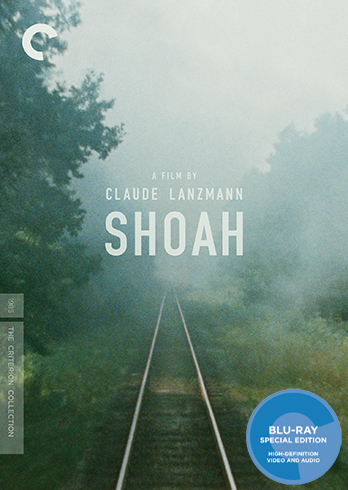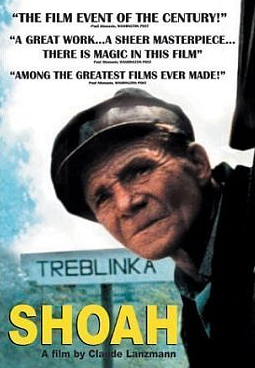I have just finished watching Shoah by Claude Lanzmann, a 550-minute documentary film about the Holocaust. I cannot imagine what words I can say about the film. How do you comment on the cinematography when the subject matter is so bleak? It was a very well-made documentary and I can see why Sight & Sound included it on their list it ranks at number 29.
The pain on the faces of those interviewed weighs heavy on my heart, but what can I say. I watched it from the comfort of my couch in my cool home, listening to descriptions of people herded like cattle from their, already subjugated homes to their deaths.
The film opens with Simon Srebnik, one of the very few survivors of the Chelmno camp. When polled, residents of the area remembered him as the boy who would sing on the river. Srebnik’s duty at the camp was to feed the corpses into the crematorium. Just prior to the Russians’ arrival at the camp, Srebnik was shot in the head and survived.
Srebnik was one of many interviewees for the film; each person tells a horrifying story about the jobs that they had and how they are connected to Holocaust. Most of the interviews brought tears to my eyes but particularly the ones with Filip Muller and Henrik Gawkowski. Muller is a survivor of Auschwitz and Gawkowski was a conductor on the train that delivered Jews to the camp at Treblenka.
The film leaves you with a strange feeling from the interviews with various aggressors, however innocent they claim to be. Interwoven with the survivor interviews were interviews with a member of the SS, a deputy from the Warsaw Ghetto, Nazi party members, and the head of the Reich Railway, the political office in change of shipping the Jews to their deaths. Each of these men speaks with a matter-of-fact attitude versus the how-it-is speech of the others interviewees. I have no doubt that they have grown weary of people pressing them for details of their military experiences.
On a personal note I think that every human needs to watch this film. If it were up to me we would be watching it with no snacks while standing, naked, for the entire time, to experience some of the shame and fear that the victims and survivors faced, but I would settle for mandatory viewing. It is easy to “know” what happened during the war but it is not possible to feel it. The film allows us to see people start crying in mid-sentence while being asking them to relive their lives for the purpose of history.
I am not sure why I chose to start my fifty-film journey with Shoah, and now that I have, I feel both ways. Starting with a nine-hour story about the Holocaust leaves me with an opportunity to look forward to forty-nine more works of, primarily, fiction. Forty-nine chances to live only in the heads of the directors rather than reliving a real-world history of the darkest time in the twentieth century. Conversely, though, Shoah feels like it would be the right way to end. It feels like a punctuation of living in fiction, forcing me to remember that is not where I live.
I viewed a copy of the Criterion Collection Blu-ray. The transfer is beautiful very well, as you would expect from Criterion. This was not an easy movie to watch and it should not be.
Trailer
https://www.youtube.com/watch?v=wV6mJ6T1oU0
Important Links
Shoah Foundation, please donate!
BFI Website
Criterion Website
Wikipedia

